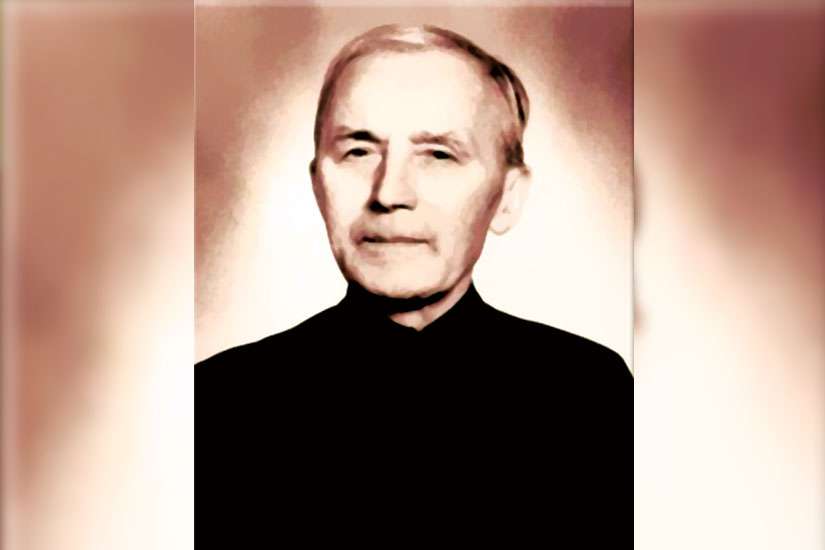After helping to establish the Church in Eastern Canada, the Oblates rolled out across the Prairies founding missions, parishes and dioceses. One of their most important Western missions was St. Albert, which in 1871 became the seat of a diocese under Oblate Bishop Vital Grandin.
In 1912, the Vatican created the Edmonton archdiocese out of the St. Albert diocese and named an Oblate, Emile Legal, its first bishop. The Oblates established the city’s first parish, St. Joachim, and managed their missions from there.
As well as ministering to aboriginal communities in their own languages, the Oblates gave generously to the francophone community, launching a weekly newspaper and even a radio station. The congregation also founded and operated College Saint-Jean, now the French faculty of the University of Alberta, and played a large role at St. Joseph Seminary. Oblates also taught at Newman Theological College.
“We actually founded the archdiocese with Bishop Grandin,” said Br. Louis Andreas, the superior of the Oblates of Lacombe Province in Alberta. “The Oblates were the founders in Western Canada.”
Currently, the Oblates are one of the largest communities of men in Canada with about 700 members.
The order exercises a number of ministries. The main one is serving the poor and abandoned in urban centres, Northern Canada and other remote areas of the country.
Oblates also work with immigrants, ethnic minorities and First Nations people. One can find them in parishes, retreat houses, in missionary formation, preaching, social justice and other pastoral ministries.
“The charism of the Oblates is basically summed up in our motto: He sent me to evangelize the poor,” said Andreas.
“One of the things we take pride in is our calling to go to those people who are not being necessarily touched by the Church. We have always been involved with native people and if we can, we try to be where they need us.”
About 15 of the 70 Oblates in the Edmonton archdiocese are fully active. The remainder are retired or semi-retired. The congregation also has 15 to 20 lay associates.
The Oblates currently run four major parishes in Edmonton — St. Albert, Lac Ste. Anne-Enoch, St. Charles and Sacred Heart of the First Peoples — as well as running marriage ministry, youth ministry, retreat ministry and hospital chaplaincy. The Oblates still support the annual Lac Ste. Anne Pilgrimage, which attracts tens of thousands of pilgrims annually.
Six Oblates came to Canada in 1841 at the request of Bishop Bourget of Montreal. “Our founder was one of those people who saw a need and responded to the need,” noted Andreas.
After helping develop the Church in the East, the Oblates came west.
“Every diocese west of Ottawa was founded by the Oblates,” said Fr. Mark Blom, vocations director for Lacombe Province.
Among the shining stars, the Oblates can count Bishop Grandin and Fr. Albert Lacombe, both legendary missionaries. There was also Br. Anthony Kowalczyk, the first Polish Oblate to come to Canada. He worked as a handyman at College Saint Jean for 36 years. Both Grandin and Kowalczyk are a few steps away from being declared saints.
At one point, there were more than 2,000 Oblates across Canada. But a steady decline in numbers forced the order to amalgamate nine Oblate provinces across Canada into just three in 2003. Now there is a French province, a Polish province and the Lacombe province, which brought together Oblates from the Western provinces, Ontario and the Maritimes.
“The time was ripe to merge together and have one administration and consolidate our finances, our ministries, our mission and also the ministry to our own community — the care of elders, formation and vocation promotion,” noted Blom.
Membership across Canada is in steady decline, said Blom, 51. No candidates are currently in formation, although one man has applied to join.
The Lacombe Oblates, however, are undergoing changes designed to strengthen them. They recently decided to create five mission centres across Canada “where you would have Oblates living together under one roof in connection with an Oblate parish,” Blom said.
One mission centre will be located at Sacred Heart of the First Peoples parish in Edmonton’s inner city.
Mission centres will also be established in Saskatoon, Vancouver, Winnipeg and Ottawa. The centres will allow the Oblates to live in community with a parish as a focal point. Because of Canada’s size and the scarcity of vocations, “the Oblates have sacrificed their community life in order to be present in all these places across the country where there are few vocations and the distances are great,” Blom said.
That sacrifice has cost the order dearly in terms of its community dynamism and missionary outlook, he lamented.
Still, Blom believes the Oblates will always have a presence in the Edmonton area.
“In a large place like Edmonton there are always going to be people who are marginalized, people who are poor, people whose lives are messy and don’t fit in and whom Jesus wants to meet through the Church. Those are the kind of people the Oblates feel compelled to minister to.”


